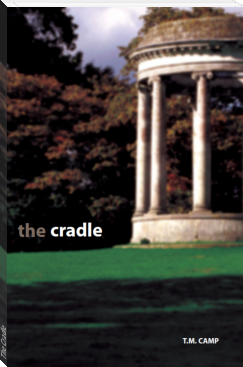Cliges: A Romance by active 12th century de Troyes Chrétien (graded readers .TXT) 📗

Book online «Cliges: A Romance by active 12th century de Troyes Chrétien (graded readers .TXT) 📗». Author active 12th century de Troyes Chrétien
By her leave Cliges came forth from the chamber and departed. And she sends for Thessala, her nurse, whom she had brought from the land where she was born. And Thessila came forthwith, for she neither lingers nor delays: but she knows not why her mistress sends for her. Fenice asks her in private conference what she counsels and what seems good to her. She neither hides nor conceals from Thessala even the smallest part of her thought. "Nurse," says she, "I know well that never a thing that I tell you will afterwards become known through you, for I have proved you right well and have found you very wise. You have done so much for me that I love you. Of all my evils I complain to you, nor do I take counsel elsewhere. You know well why I lie awake and what I think and what I wish. My eyes can see nothing to please me, save one thing, but I shall have from it neither enjoyment nor comfort, if I do not pay very dearly for it beforehand. And yet I have found my mate; for if I desire him, he, on his side, desires me too; if I grieve, he, on his side, grieves with my sorrow and my anguish. Now I must confess to you a thought and a parley, in which we two in solitude have resolved and agreed." Then she has told and related to her that she intends to feign herself ill, and says that she will complain so much that finally she will appear dead, and Cliges will steal her away in the night, and they will be always henceforth together. In no other way, it seems to her, could she continue firm in her resolve. But if she were assured that Thessala would help her in it, the thing could be done according to her wish; "But too long do joy and good fortune for me delay and tarry." Forthwith her nurse assures her that she will lend all her aid to the enterprise, let her now have neither fear nor dread in regard to aught; and she says she will take so much pains about the matter, as soon as she shall undertake it, that never will there be any man who sees her who will not believe quite surely that her soul is severed from the body, when Thessala shall have given her a drink that will make her cold and wan and pale and stiff, without speech and without breath; and yet she will be quite alive and sound, and will feel neither good nor ill, nor will she suffer any harm during a day and a whole night in the tomb and in the bier.
When Fenice had heard it, thus has she spoken and replied: "Nurse, I put myself in your care, I give you free leave to do what you will with me. I am at your disposal; think for me, and bid the folk here that there be none who does not go away. I am ill and they disturb me." The nurse tells them courteously: "My lords, my lady is unwell and wishes you all to go away, for you speak too much and make too much noise, and noise is bad for her. She will have neither rest nor case as long as you are in this room. Never heretofore that I remember had she illness of which I heard her complain so much, so very great and grievous is her sickness. Depart, and it vex you not." They speedily go, one and all, as soon as Thessala had commanded it. And Cliges has quickly sent for John to his lodging, and has said to him privily: "John, knowest thou what I will say? Thou art my serf, I am thy lord, and I Can give thee or sell thee and take thy body and thy goods as a thing that is my own. But if I could trust thee concerning an affair of mine that I am thinking of, thou wouldst for evermore be free, and likewise the heirs which shall be born of thee." John, who much desires freedom, forthwith replies: "Sir," says he, "there is no thing that I would not do wholly at your will, provided that thereby I might see myself free and my wife and children free. Tell me your will; never will there be anything so grievous that it will be toil or punishment to me, nor will it be any burden to me. And were it not so, yet it will behove me to do it even against my will, and set aside all my own business." "True, John, but it is such a thing that my mouth dare not speak it, unless thou warrant me and swear to me, and unless thou altogether assure me that thou wilt faithfully aid me and will never betray me." "Willingly, Sir," quoth John, "never be doubtful of that. For this I swear you and warrant you that as long as I shall be a living man I will never say aught that I think will grieve or vex you." "Ah, John! not even on pain of death is there a man to whom I should dare to say that concerning which I wish to seek counsel of thee; rather would I let my eyes be plucked out. Rather would I that thou shouldst kill me than that thou shouldst say it to any other man. But I find thee so loyal and prudent, that I will tell thee what is in my heart. Thou wilt accomplish my pleasure well, as I think, as regards both thy aid and thy silence." "Truly, Sir! so aid me God!" Forthwith Cliges relates to him and tells him the enterprise quite openly. And when he has disclosed to him the truth, as ye know it who have heard me tell it, then John says that he promises him to make the tomb well and put therein his best endeavour, and says that he will take him to see a house of his own building, and he will show him this that he has made, which never any man, woman, or child yet saw, if it pleases him to go with him there where he is working and painting and carving all by himself without any other folk. He will show him the fairest and most beautiful place that he ever saw. Cliges replies: "Let us then go."
Below the town in a sequestered spot had John built a tower, and he had toiled with great wisdom. Thither has he led Cliges with him, and leads him over the rooms, which were adorned with images fair and finely painted. He shows him the rooms and the fireplaces, and leads him up and down. Cliges sees the house to be lonely, for no one stays or dwells there. He passes from one room to another till he thinks to have seen all, and the tower has pleased him well, and he said that it was very beautiful. The lady will be safe there all the days that she will live; for no man will ever know her to be there. "No, truly, lord, she will never be known to be here. But think you to have seen all my tower and all my pleasaunce? Still are there lurking-places such as no man would be able to find. And if it is allowed you to try your skill in searching as well as you can, never will you be able to ransack so thoroughly as to find more rooms here, however subtle and wise you are, if I do not show and point them out to you. Know that here baths are not lacking, nor anything that I remember and think of as suitable for a lady. She will be well at her ease here. This tower has a wider base underground, as you shall see, and never will you be able to find anywhere door or entrance. With such craft and such art is the door made of hard stone that never will you find the join thereof." "Now hear I marvel," quoth Cliges; "go forward; I shall follow, for I long to see all this." Then has John started off, and leads Cliges by the hand to a smooth and polished door, which is all painted and coloured. At the wall has John stopped, and he held Cliges by the right hand. "Lord," quoth he, "no man is there who could have seen door or window in this wall, and think you that one could pass it in any wise without doing it injury and harm?" Cliges answers that he does not think he could, nor ever will think it, unless he sees it with his own eyes. Then says John that his lord shall see it, for he will open for him the door of the wall. John, who himself had wrought the work, unlocks and opens to him the door of the wall, so that he neither hurts it nor injures it, and the one passes before the other, and





Comments (0)